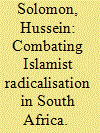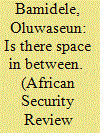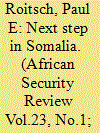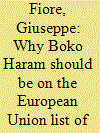|
|
|
Sort Order |
|
|
|
Items / Page
|
|
|
|
|
|
|
| Srl | Item |
| 1 |
|
| 2 |
ID:
129500


|
|
|
|
|
| Publication |
2014.
|
| Summary/Abstract |
Is radical Islamism spreading in South Africa? The answer has to be an emphatic 'yes'. When discussing issues of radicalisation in Africa, commentators often examine the case of Somalia's al-Shabaab or al-Qaeda's North African franchise, al-Qaeda in the Islamic Maghreb (AQIM). Very little attention is paid to radicalisation amongst South Africa's Muslim population. Yet, there is growing evidence that South Africa has come to play an important role in global jihadi networks, from the provision of safehouses and identity documents to the movement of funds and the existence of paramilitary camps for local and foreign jihadis. This paper aims to briefly examine radicalisation and its attendant sources in the country, as well as seeking ways to combat it utilising lessons learned from other countries. 'Institutional socialisation' by means of the sources of radicalisation, as well as the concept of what could be termed 'the democratisation of jihad' are discussed. The author also proposes ways to combat radicalisation in South Africa utilising lessons learned from other countries, concluding that issues of radicalisation and deradicalisation have to be dealt with on the part of both government and the South African Muslim community.
|
|
|
|
|
|
|
|
|
|
|
|
|
|
|
|
| 3 |
ID:
129501


|
|
|
|
|
| Publication |
2014.
|
| Summary/Abstract |
The politicisation of religion in Africa is causing the international community growing concern, particularly the smouldering hatred between Muslims and Christians. The rising wave of religious violence across the continent has given rise to a proliferation of arms that has led to armed struggle in many African states. This paper sets out to examine the recurring issue of religion and armed conflicts in some African states. It will consider two monotheistic religions - Christianity and Islam - and the way they have interacted with each other in the region. And, finally, it examines the different ways in which religious activities are related to armed conflict in northern Nigeria, northern Uganda, Sudan, Somalia and Rwanda.
|
|
|
|
|
|
|
|
|
|
|
|
|
|
|
|
| 4 |
ID:
129498


|
|
|
|
|
| Publication |
2014.
|
| Summary/Abstract |
From 2006 to 2011, al-Qaeda's East African proxy, al-Shabaab, served as the de facto ruling party of Somalia despite the efforts of the internationally recognised Transitional Federal Government (TFG). During these five years, a violent struggle between al-Shabaab and the peacekeeping force of the African Union Mission in Somalia (AMISOM) resulted in thousands of dead civilians, hundreds of thousands of internally displaced persons and a strategic environment inhospitable to reconciliation, recovery or development. By 2012, AMISOM was able to break the deadlock and force al-Shabaab from Mogadishu and Kismayo. In order to continue the momentum, the African Union and other partner nations must support the TFG in neutralising al-Shabaab throughout Somalia and providing good governance to its constituents. Al-Shabaab's revenue streams must be shut down and its offensive capability must be degraded while the strategic environment is shaped to ensure that conditions conducive to a revival do not exist. Failure to do so will likely see Somalia continuing to produce Islamist extremists and pirates to menace international maritime traffic in the western Indian Ocean, destabilise East Africa and adversely impact millions.
|
|
|
|
|
|
|
|
|
|
|
|
|
|
|
|
| 5 |
ID:
129503


|
|
|
|
|
| Publication |
2014.
|
| Summary/Abstract |
In the course of the last few years, the Islamic sect Boko Haram has become of great interest to academics, researchers and analysts. At the same time, experts, especially at the European Union (EU) level, have been reluctant to include Boko Haram in the EU list of terrorist organisations, despite the fact that this group has clearly demonstrated its transformation into a terrorist organisation. Security challenges and threats are, by definition, subject to change, and it is the task of security institutions to create policies to address these challenges and threats. Terrorism cannot be addressed in isolation, and policymakers are confronted at all levels with the difficult task of making sense of this evolution. By assessing the current security situation in Nigeria, this commentary tries to ascertain the potential repercussions to regional stability from the Boko Haram phenomenon. Insurgencies have often been initiated from and supported by neighbouring countries and have expanded conflicts across borders. Countering Boko Haram will require various institutions to conduct similar and concurrent counter-insurgent and counter-terrorist operations. At the global level, such co-ordination has often proven difficult. The EU has to keep the pace in this case.
|
|
|
|
|
|
|
|
|
|
|
|
|
|
|
|
| 6 |
ID:
129502


|
|
|
|
|
| Publication |
2014.
|
| Summary/Abstract |
Impressive investment and growth figures and commercial write-ups enthusing about 'Africa rising up', 'the continent of the future', and so on, obscure the poverty, illiteracy, poor health and other hardships afflicting the vast majority of African people. Why has massive so-called development and technical 'aid' not created the expected dynamic, autonomous economic progress? A blind eye is delicately being turned to the decisive role of people - more specifically, the cultural element. Notwithstanding good intentions, outsiders seeking to promote development assume that black Africans think and act like they only need more education, training and finance in order to 'catch up'. Outsiders easily forget that since time immemorial, Africans have developed and cherished worldviews and cultures of their own. While these are by no means immutable and do adapt to changing needs and outside influences, Africans refuse to cast off overnight the heritage that makes them the people they are. This paper examines the impact of witchcraft as an integral feature of traditional culture on African existence, notably community life, religion, politics, the law, and economic practice. It stresses the significance of traditional society's powerful egalitarian impulses as well as its profound conviction that all things - goods, wealth, well-being and life force - are in a strictly limited supply that cannot be increased, but can only be redistributed by force or through magical manipulation. While modern life gradually weakens the influence of witchcraft beliefs - in Europe these flourished well into the 18th century - the exasperation associated with Africa's headlong urbanisation actually bolsters these beliefs.
|
|
|
|
|
|
|
|
|
|
|
|
|
|
|
|
|
|
|
|
|